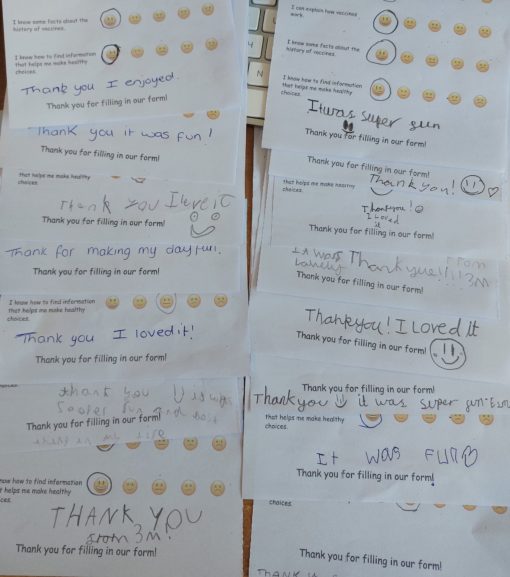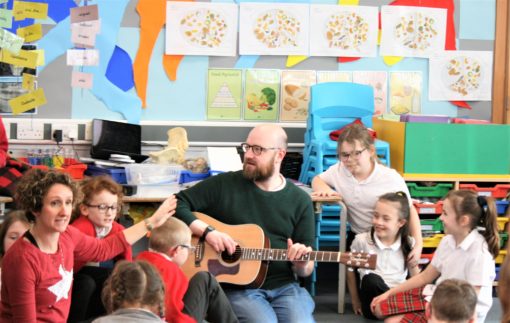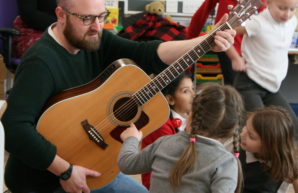Using music and dance to help children make healthy choices
Posted by Darren Leadsom on 18 August 2023
A music and dance project designed to help children make informed choices about vaccination has reached 3800 children in 24 primary schools in the Lancaster and Morecambe area in 2022/23. The project has collected clear evidence that children felt more informed and confident about their knowledge about vaccines and how to make the right choices about their health after taking part.
‘The Alien Needs Our Help’ was a public health arts project created by More Music and Ludus Dance, aimed at KS2 school children in Lancaster and Morecambe, taking place in schools from February 2022 to July 2023. ‘The Alien Needs Our Help’ was designed as a six-week programme (working with the same two classes each week) which used songs and dance activities to share important facts about vaccines, their history, how they work and how children can stay healthy and safe. The aim was to provide children with relevant facts enabling them to make informed choices about vaccination when they are older. Each session was delivered by a team of a dancer and a musician.
The project was commissioned by Lancaster City Council’s Public Protection team in Autumn 2021. The funding came from a national health promotion initiative in response to the Covid pandemic to tackle vaccine hesitancy, which was delivered in different of ways across the country. Lancaster City Council’s decision to commission arts organisations to create participatory creative projects to communicate the information (as one element of their wider programme across the community) was a unique approach, compared with other areas nationally.
Upon receiving the commission, artists and project managers from More Music and Ludus Dance embarked on a detailed planning and development process over several days. This involved reviewing the project outcomes and the key health information to design and structure a creative programme for KS2 pupils. The collaboration was a great opportunity for our two organisations to learn more about how each other work, how the two different artistic disciplines could be used together and share expertise. As well as utilising core staff, both organisations were able to bring in freelance artists and create meaningful employment opportunities for them, which also offered them the chance to help creatively shape the project from the start.
Following three pilot projects in Spring and Summer 2022, the project was launched publicly for the 2022/23 academic year and offered free to primary schools in the district. It was eventually delivered 36 times in 24 primary schools across Lancaster and Morecambe, working directly with approximately 2000 schoolchildren, who shared their learning with 1800 children through end-of-project performances. The project was repeated in a number of schools based in areas of comparatively low vaccination uptake, with multiple year groups.
So why was it called ‘The Alien Needs Our Help’? The sessions would begin with an alien (played by the dancer) asleep on the floor as the schoolchildren came in, where they would be greeted by the musician playing a musical instrument. The musician would encourage the children to wake up the alien, who would then explain they were from another planet and were worried about germs and viruses. Over the course of the project, the children learnt songs and movements which they used to help the alien discover how to stay safe and be able to share vaccination and health facts with her home planet. The final session was an opportunity for the children to share their knowledge with other classes through a performance of the songs and movements they had learnt, which explained the history of vaccines and how they work to protect the body from infection.
A number of memorable songs were written especially for the project to help embed the learning in a fun and interactive way. A song about hand washing was written to be sung by children for the recommended handwashing time of 20 seconds. Other songs told the story of Edward Jenner, the scientist who created the first vaccine in 1796, and explained how to stay safe from germs. Dances and movements taught to the children embedded the knowledge, which teachers commented helped some children to engage and retain information better than in classroom-based lessons.
You can listen to the songs from the project here
EVALUATION
The impact of the project was measured via prior and post evaluation with the children in each school, follow-up evaluation with teachers, feedback from the delivery team and observations by the project managers and funders.
The participating children were asked how strongly they agreed with five statements at the start of the project and at the end, each filling in a short evaluation form. They scored their response of how much they agreed with each statement by circling one of five simple ‘smiley’ faces, choosing from very happy, happy, neutral, sad, unhappy and very unhappy. The responses were collected from each school and collectively scored 1 to 5, with the strongest agreement with the statement scored as 5 and the least agreement marked as 1. The scores were added together and divided by the number of responses to generate average scores for each project of between 1 to 5.

These are the statements from the evaluation with the collated score at the start and at the end from all projects, as well as the percentage increase in agreement with the statements by the end of the project:
1: I know how to stay healthy and stop germs from spreading.
- Start score: 4.40
- End score: 4.64
- Percentage increase from start to end of project: 5.48%
2: I know how my body can fight germs.
- Start score: 3.61
- End score: 4.36
- Percentage increase from start to end of project: 20.80%
3: I can explain how vaccines work:
- Start score: 2.79
- End score: 3.79
- Percentage increase from start to end of project: 35.62%
4: I know some facts about the history of vaccines
- Start score: 2.27
- End score: 4.12
- Percentage increase from start to end of project: 81.32%
5: I know how to find information that helps me make healthy choices.
- Start score: 4.05
- End score: 4.27
- Percentage increase from start to end of project: 5.43%
The data shows improvement across all statements. There were significant increases across statements 2, 3 and 4. In particular, there is a massive 81.32% increase for statement 4, where participating children as a whole felt significantly more confident about knowing some facts about vaccine history.

FEEDBACK FROM TEACHERS
Feedback from teachers was gathered via an online questionnaire created through the Culture Counts evaluation platform. Their responses were very positive, particularly regarding the effectiveness of using music and dance to embed learning.
– ‘The use of acting, dance and music has definitely helped engage some children who would otherwise struggle to listen sat at a table, or on the carpet. Their memory has improved in recalling facts, linked to learning through song. The children have worked well in groups to create content, something they are good at in this cohort, but they did particularly well during these sessions.’
– ‘The children have continued to sing the song so the message has carried on as well as the facts. The children enjoyed the dance sessions.’
– ‘Some of the quieter children who worry about putting their hands up in class, and so don’t always actively participate – happily contributed to the sessions.’
– ‘We were unsure at the beginning because it was out of the usual type of music and dance which we have engaged in before. However, the children were very engaged, enjoyed it and have learned new facts which they have remembered ‘sticky learning’. The science link is a huge bonus to the project because science is a school focus at the moment.
– ‘The children have remembered the facts which they learned through the dance and song, therefore, it has had a positive impact on their learning.’
– ‘All the children learn lots about the topics covered. They have recalled the facts by singing the songs and doing the actions. Provided good discussions and questions’
– ‘The children really enjoyed the song that was used and the importance of hand washing was really understood!’
– ‘Children had great fun and developed memory skills of learning about the history and importance of vaccines. The physical nature of dance and drama together with the rhythm of the music helped children connect with the information.’
– ‘Ideas and concepts are physicalised & vocalised this helps children process knowledge on a practical level. Through ‘doing’ the knowledge they body retains the memory, as the whole body has an experience of it, rather than just the eyes or ears.’
– ‘The use of song to help their learning and the remembering of facts was effective.’
– ‘The children are able to articulate and describe what this is, how vaccines are important, and also the history of vaccines! Learning through song really helped this.’
– ‘It helps children engage with their minds and their bodies, enables a whole child approach to learning. This engages children who may struggle to read and write, or to access information.’
CREATIVE TEAM
Project Managers:
Rachel Deadman, Rebecca Reoch (Ludus Dance) and Darren Leadsom (More Music).
The project content was developed and created by:
Kriss Foster, Anni Tracy (More Music), Leila Chebbi and Jordan Sheard (Ludus Dance) with the project managers.
Once school sessions began, the delivery team of Kriss, Anni and Leila were joined by Sian Phillips (More Music), Rachel Li and Sophie Barrow (Ludus Dance), who helped to refine the project in practice as they delivered it.
Thanks to Fiona Inston at Lancaster City Council for commissioning the project and her support
